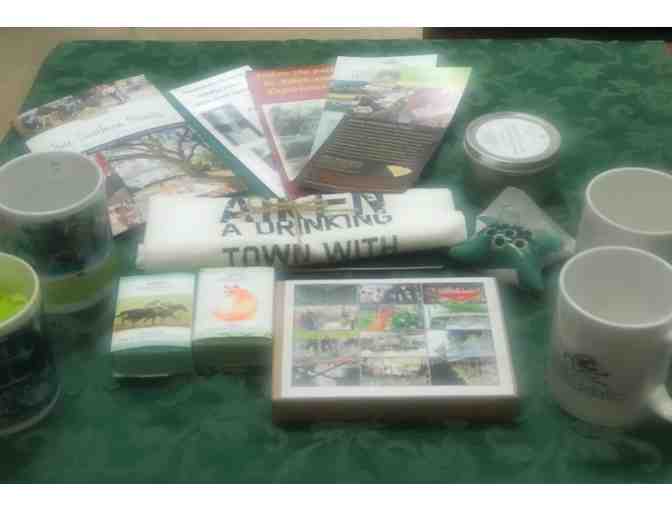Travel
Destination Aiken - Gift Package #2
- Item Number
- 141
- Estimated Value
- 300 USD
- Opening Bid
- 150 USD
Item Description
Gift Certificate for thee Inn at Houndslake - Brunch
Gift Certificate for Malia's Restaurant - $50
120 Laurens St, SW
Aiken, SC 29801
Aiken a drinking town with a horse problem - Cotton towel
"DRAG" Shea butter and olive oil soap
"STRETCH" Shea butter and olive oil soap
Frog for 2 vase
Mug - "The Inn at Houndslake"
Mug - printed with a colorful fountain and trees
Mug - printed with a colorful tree and a man on a horse
WoodWick ® Soy Candle - Lavender-Vanilla scent
Item Special Note
The Beginning
The South Carolina Canal and Railroad Company was established in 1828. William Aiken, president of the Railroad Company and one of South Carolina’s leading cotton merchants, hired Horatio Allen, a distinguished engineer who later built the Brooklyn Bridge, to build a railroad from Charleston to Hamburg, South Carolina, a site on the Savannah River. Work began in 1830 and on October 2, 1833, the first train arrived in the newly established town of Aiken, named in honor of the first railroad president. In 1834, engineers Alfred Dexter and C. O. Pascalis laid out the town with its wide streets and parkways, and Aiken was chartered in 1835. Aiken attracted many visitors, particularly wealthy Charlestonians who spent their summers at the "place of retreat from the heat and malaria of unhealthier regions." In 1865, as the War Between the States neared a conclusion, Confederate General Joseph Wheeler took his position in the town of Aiken to oppose Sherman’s raid and put an end to the Union advance westward. It was one of Sherman’s rare defeats along the way.
The Winter Colony
Aiken recovered quickly from the War and in 1870 began to attract wealthy Northerners, who were lured to the area by the opportunities for equestrian sports, thus establishing Aiken’s celebrated “Winter Colony.” Among those who wintered here was Thomas Hitchcock, who with the Whitney’s established the tract of land known as Hitchcock Woods for public use.
The restorations experienced in houses and churches reflect the wealth and sophistication of the population during the Winter Colony era and illustrate its impact on the community. Hayne Avenue, Colleton Avenue, South Boundary and Whiskey Road are old, fashionable residential avenues which attracted both local residents and winter visitors to build beautiful homes. Historic downtown Aiken continues to serve as a vibrant business hub for the community and provides a unique identity and charm for the area.
Savannah River Plant (a/k/a Savannah River Site)
The historical importance of the site is best understood by recalling the war-time urgency that the Nation felt in 1949 when the Soviet Union exploded a nuclear weapon. The Nation was shocked, and President Harry Truman chose to respond to a perceived openly aggressive action.
The Savannah River Plant (now SRS) was the major U.S. step in that response. Truman asked the Atomic Energy Commission (AEC) and the Du Pont Company to design, build, and operate a facility to produce nuclear materials (mainly tritium and plutonium) for the "super" (hydrogen) bomb. The first public announcement of the Site was made in November 1950 and ground was broken in February 1951. The first production reactor was taken critical in December 1953. The unprecedented construction project employed up to 38,582 workers in building more than 200 structures on the 300-square-mile Site.
The Site succeeded in meeting the Soviet challenge, and made a large contribution to winning the Cold War. Not only did the Site meet every product shipment, on time and within quality specifications, but did so with an unprecedented safety record and with environmental stewardship that was decades ahead of its time.
(Historic information above is compliments of the SRS Heritage Foundation.)
These three events, although not the only major events in our history, had a tremendous effect on defining and shaping Aiken. We hope you’ll be intrigued to learn more about our fascinating past and enjoy Aiken’s present when you visit.
UNIVERSITY OF SOUTH CAROLINA EDUCATIONAL FOUNDATION stores data...
Your support matters, so UNIVERSITY OF SOUTH CAROLINA EDUCATIONAL FOUNDATION would like to use your information to keep in touch about things that may matter to you. If you choose to hear from UNIVERSITY OF SOUTH CAROLINA EDUCATIONAL FOUNDATION, we may contact you in the future about our ongoing efforts.
Your privacy is important to us, so UNIVERSITY OF SOUTH CAROLINA EDUCATIONAL FOUNDATION will keep your personal data secure and UNIVERSITY OF SOUTH CAROLINA EDUCATIONAL FOUNDATION will not use it for marketing communications which you have not agreed to receive. At any time, you may withdraw consent by emailing Privacy@frontstream.com or by contacting our Privacy Officer. Please see our Privacy Policy found here PrivacyPolicy.

